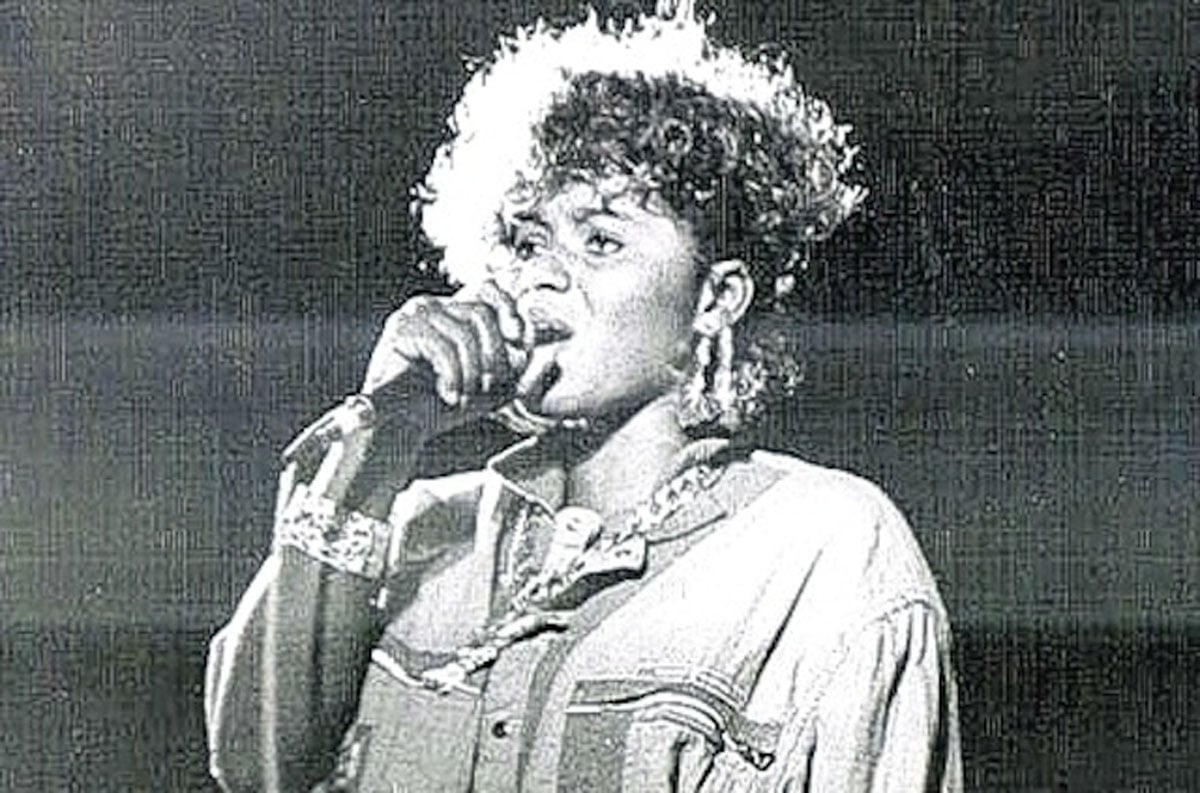Remembering Dancehall Legend Sister Charmaine: Five Influential Songs

In tribute to an outstanding career spanning through the mid-’80s and ’90s, DancehallMag honors the legendary Sister Charmaine for her incredible contribution to the Dancehall genre. Charmaine, whose real name was Charmaine McKenzie, died unexpectedly on January 5, 2021 , at the age of 53. The Dancehall icon’s funeral took place today, January 16.
In a time when women in the industry were overlooked, Sister Charmaine managed to carve out a name for herself in a male-dominated space. She is recognized as a revolutionist who significantly influenced the female movement in Dancehall. Her confidence and fearlessness were unmatched but her passion and love for Dancehall were like no other. She was described as a “Dancehall and Reggae giant,” and “Legend” by her peers and highly admired within the music community.
Sister Charmaine established herself as a force to be reckoned with on the big stage. Her long-time friend and colleague, fellow deejay, Lady Ann attested that she was in fact, “The maddest ting onstage, nothing no bad like her.”
She will forever be remembered for her shrewd music and performances at Sting, especially the ‘Four The Hard Way’ clash in 1989, which included Lady P, Lady Patra, and Lady G, who in the end, all bowed to their conqueror that which was the mighty Sister Charmaine.
Here are 5 songs from Sister Charmaine’s remarkable Dancehall journey:
Granny Advice (Hol’ A Cuff) (1987)
Produced by Winston Riley of Techniques Label in 1987, Granny Advice was a huge hit for Sister Charmaine. The track described a series of real events that Charmaine encountered growing up in the ghetto but she says it’s a good thing Mama was so vocal in her life. The deejay would sing of several life lessons “Mammy” taught her, “She say mi muss’n beggy beggy and mi muss’n licky licky,” stay home and study and repeatedly, “Nuh walk in a posse.”
These would ring out clearly in her mind as she copes with a certain young man, Crainy, who uses her while double-dealing with another woman. Sister Charmaine is no pushover, however, so when the other woman comes to boss her around, well … “She a hol a cuff’n, she ah go get a coffin.”
Bun (1991)
Charmaine’s 1991 release Bun, was produced by Rough Neck Productions and featured on the Agony Body Riddim. The single boldly tackled a social battle of the sexes as it pertains to infidelity. A bird can’t fly on one wing she says, acquiescing the ladies to having a “sweetheart and darling” and in other references a “prince and a king.” If the men are cheating and giving Bun then, “Ah full time fi di man dem get some.”
She highlights the blatant injustice of cheating among genders, where it’s acceptable for men but argued upon when women do the same. Charmaine rubbishes these devised principles, telling the ladies, “Ah nuh sin if a two man we keeping.”
No Disrespect (1990)
Released in 1990 through Leggo Records, Sister Charmaine’s No Disrespect was a succinct disclaimer to entertainers like Papa San, Admiral Bailey, General Trees, Little Lenny, Professor Nuts, Lt. Stitchie, Flourgon, Ninjaman, and others that though she jokes about the things they were most notable for in their songs at the time, she means no harm but rather asks for assistance in making her career as successful as theirs.
The track presents a narrative of the hardships in catching a break in music, “It look like dem set duppy pon me,” she says so can Admiral Bailey work some Science Again to make her “buss.” Sister Charmaine would then go on further to ask Little Lenny for the cure to having a Healthy Body and Lt. Stitchie to help her find a shoe that fits so as to Wear Yu Size … these she quips are the answers to unlocking fame.
No Disrespect, which likely inspired Ce’Cile’s 2000 hit Changez , was a burst of comedy giving audiences something to laugh about while showcasing her creativity and lyrical wit.
The Body (1987)
Charmaine’s rendition of Dancehall vet Red Dragon’s 1987 hit single, The Agony , was simple proof that she had the chops to ride any riddim and just as well as the men.
She did the same, sampling Shabba Ranks’ Trailer Load of Girls with her very own track, Trailer Load A Man in 1991, also Little Lenny’s Gun Inna Baggy with her remake, Healthy Woman in 1990 and another Red Dragon hit, Hol A fresh with her version, Hol a Rest in 1988 among a few others.
In The Body, Sister Charmaine interchanges and mixes her own lyrics on the original concept of The Agony. She insists that with eating healthy, going to the gym, and maintaining a good weight, she has the “body to control the agony”. Even though she refrains from spelling things out, the deejay manages to stir an element of allure as she challenges any man to come see just how well she can “handle it.” Released in 1987, We Have The Body was another production by Winston Riley of Techniques Label.
Community Girl (1988)
Released in 1988 by Wiston Riley and Soljie, this one finds Sister Charmaine speaking her truth about the tough times in her community. Coming from the country to live in Kingston City, she felt like an outcast, the guys would make fun of her on the road and “tek liberty”.
Charmaine describes her hard-knock life – “None a di man dem neva want me. Days after days white squall a bite me (she went hungry). Going to school mi neva have no money.” Then in a turn of events, she gained success through her music and “turn celebrity” and that’s when the same men that chided her started showing her love. But she sees through all the fakeness, “Mi reach weh mi reach and dem can’t stop mi.”
https://www.youtube.com/watch?v=tD7tyARSbKo
